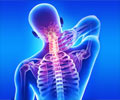Patient satisfaction ratings after surgery for spinal degenerative disease line up well with the level of improvement in pain and disability achieved, say researchers.

The researchers analyzed one-year follow-up data on 1,645 patients undergoing surgery for degenerative disease of the upper (cervical) and lower (lumbar) spine. Before and one year after surgery, the patients were evaluated using standard rating scales for disability and neck, back, arm and leg pain.
Based on a spinal surgery satisfaction scale, 83 percent of patient said they were satisfied with the outcomes of surgery one year later. The researchers wanted to see whether any of the factors evaluated before surgery could predict whether patients would be satisfied or dissatisfied with their outcomes.
After adjustment for a wide array of patient-specific factors, several specific predictors were identified. Patients who didn't have at least a 15 percent improvement on a standard disability rating scale--considered to be the "minimal clinically important difference"--were four times more likely to be dissatisfied with their surgical outcomes.
Patients who didn't achieve minimal clinically important differences in pain scores were about three times more likely to be dissatisfied with the results of surgery. Patients who were on Medicaid or uninsured also had lower satisfaction rates, as did those with higher initial pain and disability scores.
Patients with depression or anxiety before surgery were less likely to achieve clinically meaningful improvement, and had lower satisfaction rates. However, after adjustment for initial pain and disability scores, these mental health factors were not significant predictors.
Advertisement
The new study shows that patient satisfaction ratings after surgery for spinal degenerative disease line up well with the level of improvement in pain and disability achieved. The researchers write, "Surgical ineffectiveness was a strong independent predictor of dissatisfaction."
Advertisement
The study may provide tools to help identify individuals at risk of dissatisfaction and to improve the delivery of spine care, Dr. Devin and coauthors believe. They conclude, "Individualizing the patient preoperative counseling on the basis of these patient-specific factors can improve patient satisfaction with outcomes."
Source-Eurekalert










